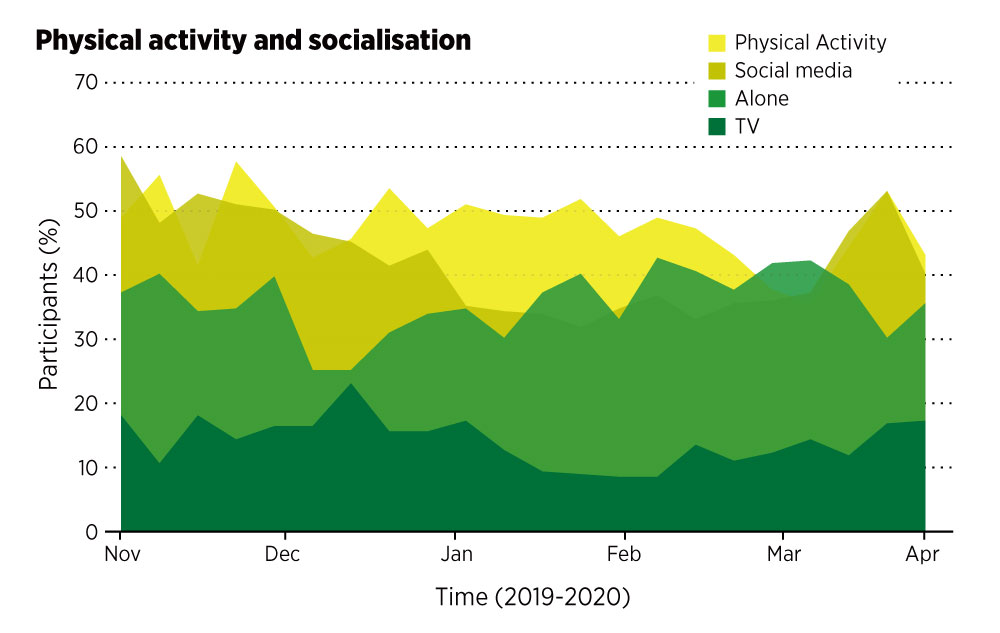You can search for courses, events, people, and anything else.
Researchers from Western’s Translational Health Research Institute who had been investigating the determinants of adolescent health and well-being seized on a unique chance presented by the COVID-19 pandemic.
When physical distancing interventions were suddenly introduced in March 2020, Sithum Munasinghe and his colleagues, Sandro Sperandei and Andrew Page, had to think on their feet; they recognised that the unprecedented circumstances brought an opportunity. “No-one could pre-plan this type of research,” Munasinghe explained. “As we had captured well-being data before and after physical distancing measures were implemented, we were able to examine the mental health implications of these measures on young people.”
Funded by the Australian Prevention Partnership Centre, the project used social media to recruit approximately 600 teenagers aged between 13 to 19, from the Western Sydney area — in the 2021 census about 7.7% of the Western Sydney LGA population were between aged 12-17 years. Data collection involved obtaining daily, weekly, and monthly data on diet, physical activity, sedentary behaviour, and psychological well-being using short questionnaires and sensor measurements; all using smartphones. “We were able to use Ethica’s sensor-based app installed on participants’ smartphones to capture movement-related data; for example, whether someone was walking or running,” says Munasinghe.
“The most difficult part of data collection in longitudinal studies is the follow-up,” explained Sperandei. “We were able to send follow up surveys to the participants’ smartphones using the app, making it very convenient and negating the need for cumbersome mail-out processes.”
The researchers used these data in combination with information on hospital presentations reported by their partner research agency, the Mental Health Service at the Western Sydney Local Health District. “We had a significant increase in young people coming to hospital, more than any other age group,” explained Vlasios Brakoulias, Director of the Western Sydney Local Health District Mental Health Service.
Need to know
- Adolescent behaviours provide useful indicators of longer term well-being.
- Physical distancing as a result of COVID-19 significantly increased social isolation and decreased happiness levels among Sydney adolescents.
- Sensor-based measurements via smartphones proved to be a convenient data collection approach.
The data showed clear changes in behaviour among adolescents before and after the enforcement of COVID-19 physical distancing policies. “We saw a significant decrease in self-reported fast food consumption, physical activity and happiness levels after physical distancing policies were put in place,” says Munasinghe. “On the other hand, internet use, time spent on social media, and time in solitude had significantly increased.”
These findings, published in the Journal of Adolescent Health, illustrate that physical distancing measures had negative impacts on adolescent mental health. “Social isolation is considered a risk factor for developing mental health conditions,” Munasinghe stated. “Teenagers need activities that keep them socially engaged, connected and physically active.”
Importantly, the research findings prompted the government to increase funding in mental health services for young people. “The findings picked up a strong signal that young people are experiencing the most distress during this crisis, and gives us some hints as to why this might be the case,” says Brakoulias. “It demonstrates that we needed to improve support services for young people, and that’s exactly what we’ve done.”
The research team are seeking to extend this study to determine participants’ mental health trajectories and subsequent hospital admissions related to self-harm. However, Brakoulias notes that we all have a role to play in safeguarding young people’s mental health. “It’s important that we keep an eye out for our young people, check on them regularly, support them where you can and refer them for help, such as the mental health services available, if you think they’re not coping.”
Sperandei is also hopeful that this data collection method will be adopted in other studies, “We are attempting to use this method with other projects, using wearable devices.”
Credit
Future-Makers is published for Western Sydney University by Nature Research Custom Media, part of Springer Nature.
© Sincerely Media/Unsplash
© Annie Spratt/Unsplash
© Emily Underworld/Unsplash





